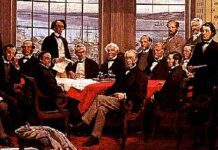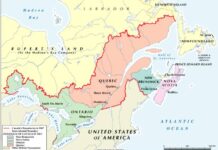In 2017 we celebrate Canada’s 150th birthday, and on July 1 it will be marked by festivities from coast to coast to coast. But how much do we know about this great event? Did the Dominion of Canada spring fully-formed into existence as the first seconds of July 1, 1867 ticked by?
It can be said that nothing is inevitable in history until it actually happens, and there was certainly nothing inevitable about the creation of this new country 150 years ago. In fact, there were so many ways in which it could have been different, so many alternatives that had to be considered in the decade before 1867, so many obstacles, close calls, false starts and deep disagreements, that there were times when it seemed Confederation was never going to happen at all.
Over the coming weeks, we will be publishing a series of articles on the Story of Confederation, and it may be that some of the stories told will come as news, and surprising news at that, to many Canadians. There is a tradition in this country that our history is rather boring, a dull recital of politics and personalities that pale in comparison with the exciting dramas of other nations. After all, we never had a Civil War, we never had to fight for independence from an oppressive empire, and we don’t have a history of patriotic martyrs, Fathers of the Nation dreaming great dreams of freedom, democracy and identity.
As a matter of fact, Canada has had all of these, far more than we often realise. Canada did not suddenly appear out of nowhere in July, 1867. Instead, it came to life through years of drama, intrigue and excitement. It faced wars, danger of war, threatened invasions and actual invasions by foreign troops. The story involves raids, hijackings at sea, complicated relationships with the British Empire, complicated relationships between allies and foes, shifting alliances and political skullduggery.
Just as in the American struggle for independence, Canada, too, had its Founding Fathers, the ones we call the Fathers of Confederation. Everyone knows about John A. Macdonald, and possibly George Etienne Cartier. But who remembers the bravery and determination of the Atlantic Fathers, Samuel Tilley, R. D. Wilmot, Charles Tupper and their allies? There was Alexander Galt, the financial genius and political thinker who almost single-handedly designed the new nation’s structures and procedures?
Of course, there was the dark little Irishman, Thomas D’arcy McGee, whose eloquence and vision raised Canada from being just another political union and gave it the dream of making a new nationality in North America, not British, or Irish, or French, but simply Canadian. He worried that perhaps Canadians would not really appreciate what was achieved by Confederation:
“I verily believe that if we had bought the new Constitution with our blood, if we had paid for it its deserved price, we would understand its value better”. Ironically, he would not live to see Canada’s first birthday, shot down on Sparks Street, Canada’s only federal politician to be assassinated.
The story of Confederation is one which needs to be told and understood by Canadians in this, our 150th year. Canada did not wait for Vimy Ridge, or Dieppe to realise its identity as a distinct nation. When the bells tolled at midnight on July 1, 1867, people across the new country celebrated an achievement few had thought possible even five years before. This was not the Canada we know today. Looking at the map, Ontario and Quebec were less than half their current size. No-one was sure where the western border of Ontario lay, before the beginning of the great expanse of Rupert’s Land, home of First Nations and a trading settlement at Red River (now Winnipeg). Prince Edward island and Newfoundland had refused to join this strange experiment. British Columbia was no more than a Crown Colony around Vancouver Island.
There is nothing inevitable in history, until it happens. And there was nothing inevitable about Canada in 1867, and no guarantees that the new experiment in nation building would survive for very long.
The fact that we can mark 150 years since the turbulent, exciting, ambivalent, tortuous, violent and visionary months of the mid-1860’s is a testament to the people who made it happened, and those who came after to ensure its continued growth, its faithfulness to the scope and imaginative openness of the men (and they were all men in those days) who forged something great, almost in spite of their era and its philosophies. It is quite a story.








